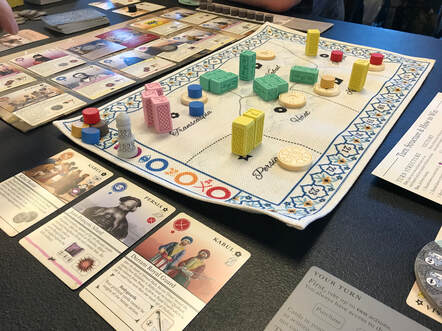 Full Disclosure: Wehrlegig provided me with a review copy of Pax Pamir. What is this game about? Pax Pamir is a game about The Great Game. Britain and Russia spent a hefty chunk of the 1800s vying for political influence in Afghanistan. In Pax Pamir, you represent a powerful family in Afghanistan that is trying to make the best of a tough situation and whose loyalties may lie with Britain, Russia, or Afghanistan itself—or even all three at different points throughout the game. Pax Pamir is not an easy game, but its victory condition is very straightforward. All you have to do is win the most points, either by the end of the game, or sooner if you can open up a commanding lead of 4+ points. Points are only earned in two ways. The first is to be allied with the winning faction (Britain, Russia, or Afghanistan) in a dominance check. If multiple players have thrown their lots in with a dominant faction, then they dole out points according to how much influence each of them has with their empire of choice. The second way is to have the most personal power in the country. If there is a failed dominance check—i.e. no faction is dominant—then points are given out based on which player has the most influence on the map, as represented by tribes, spies, and gifts given to imperial patrons. Within those simple victory terms, however, there is a lot going on in a game of Pax Pamir. You only get two actions per turn, but deciding how to spend them is not easy. All of your actions are based on the cards that you purchase and place throughout the game. But which cards will you play? Which will you keep in your hand? Each card does something different, whether it is let you place roads and armies on the map for your chosen empire, collect taxes (money is tight in this game), place spies, use your spies to murder other people's cards, put your own tribal units out on the map, or move pieces that you've already placed. The result is an intense experience that is different every single time you play.  The production values for this game are off the charts. The production values for this game are off the charts. How does it play solo? Pax Pamir is a highly interactive game, but Ricky Royal has provided us with Wakhan—an aggressive AI opponent who will give you a serious run for your money. Wakhan represents not a rival family, but a political/religious movement that is spreading through Afghanistan independently of government powers—and that has "pragmatic loyalty" to all three empires in the region. Wakhan is controlled by a small but highly efficient deck of cards that will list possible actions for Wakhan, which the player will take for her according to Wakhan's abilities at the moment (she does have to pay for things) and according to her priorities, which are clearly spelled out. Although getting used to Wakhan can take a couple of plays, once you know how to play her turns, she is an efficient AI opponent to manage and a challenging one to defeat. Wakhan can also be added as a third player in two player games, if that is your sort of thing! Overall Thoughts Wakhan is a worthy and highly enjoyable opponent to spar with. It is no mean feat to take her down, and I love a relatively streamlined AI opponent who is also tough to beat. To play well against Wakhan, you will absolutely have to leverage everything you know about how to play the game, and you'll find that you are really pushing yourself to wring the most benefit out of every single action you take. That is everything I want in a solo mode. My only quibble with Wakhan is that while usually she is almost unnaturally good at making the most annoying move possible, there are moments where she behaves erratically and not entirely in her best interests. I should also say that Pax Pamir is a tremendous game both in and out of solo mode. The production values are absolutely stunning, to the point where Pax Pamir's aesthetic value actually gives a boost to your gameplay. But most importantly, the game is easy to learn, but very difficult to master. There is so much subtlety to the choices you make, and so much strategic depth, that I can see myself coming back to this one again and again in my attempts to truly get good at it. (And despite many plays, I don't feel like I am a "good" player.) In my opinion, Pax Pamir represents a notable achievement in gaming, in that it is highly replayable not just because of the variety of its cards, but because there are so many possible ways for a game to unfold. There just aren't many games out there that make me want to practice and improve my play. But Pax Pamir is one of them, and it's fabulous. Do I recommend it? Yes. Heck yes. Just know that you're getting into a surprisingly heavy experience, and plan for your first game to truly be a learning game. Overall Rating: 4.5 stars Rating Scale: 5 stars — I love it! 4 stars — I really like it. 3 stars — I like it. 2 stars — It's okay. 1 star — Meh.
6 Comments
Smithers
9/15/2019 05:27:36 am
> After the collapse of the *Ottoman Empire* ...
Reply
kiterunner
10/3/2019 05:35:40 pm
Would you recommend buying Pax Pamir if you'll only ever play it solo?
Reply
10/5/2019 01:47:06 am
That's a really tough question because it's such a personal choice. For me, Pax Pamir is worth it. I received a review copy of it, but if someone took it away, I would shell out for a new copy. It's challenging and exciting enough that I know I'll get a lot of play out of it—mostly solo, but sometimes in a group. I'm also into the theme and the gameplay.
Reply
Paul H
7/30/2020 11:05:01 pm
I’ve been intrigued by this game for a while. I only play solo-able games (due to lack of players) and a like somewhat complex games. For instance: Robinson Crusoe.
Reply
Your comment will be posted after it is approved.
Leave a Reply. |
AuthorMy name is Liz Davidson, and I play solo board games. A lot of solo board games... Archives
August 2021
Categories
All
|
 RSS Feed
RSS Feed